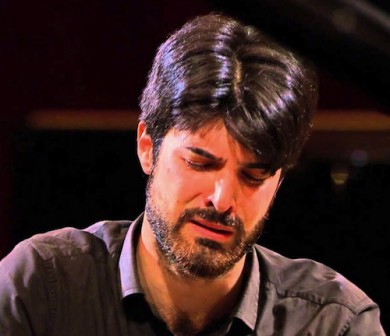Carrochia shines in Chopin and Scriabin at Miami Piano Festival
The Miami International Piano Festival takes pride in presenting undiscovered performers on the cusp of their careers.
And so Saturday evening at the Colony Theater in Miami Beach, the festival hosted the United States debut of the Italian pianist Luigi Carroccia, who graduated from the Claudio Monteverdi Conservatory of Bolzano in 2013 and is making the rounds of European competitions and concert halls.
From a glance at the composers on the Discovery Series program, this would appear to be a young man’s concert, promising a keyboard-pounding evening of flash and fire. There was Scriabin, Chopin and Rachmaninoff, with Bach appearing only in an arrangement by the Italian pianist and composer Ferruccio Busoni.
But while Carroccia has ample technique, he chose works from these composers’ more lyric and contemplative sides, giving a recital in which his range of tone colors, gift for long melodies and yes, ability to zip up and down the keyboard and play rapid-fire octaves when called for, came in service of the music.
Carrochia may want to work on his stage manner, though, since he came off as impatient and dour. The pianist bowed quickly after each work and seemed as if he could not get off the stage fast enough.
He opened with a grave and solemn performance of the Bach-Busoni choral prelude “Ich ruf zu dir, Herr Jesu Christ” (“I call to you, Lord Jesus Christ”). His soft but assured style drew glowing, organ-like tones from the keyboard, with a big crescendo toward the end that rose and fell without a trace of percussiveness.
Alexander Scriabin composed his Sonata No. 3 in his late 20s, before the Russian pianist-composer’s mind and music departed for unchartered territory. Unlike what was to come later, this work’s melodic and harmonic vocabulary sounded similar to what his late-19th century colleagues were composing.
Carroccia gave a rousing performance, without over-personalizing the music, nor engaging in the sort of rushed, emotionally supercharged playing with which some pianists distort this sort of piece. He showed respect for the rhythmic and melodic structures, with his big tone and assured technique drawing forth the music’s Chopinesque romanticism, its bursts of melody and climactic passages in octaves. The bass figures in the Andante came off with a smoky allure, and in the last movement, he drew maximum force and emotion from the sudden rhapsodic melody that rose over rumbling bass passages.
From Chopin, he chose some of the composer’s final works: the Barcarolle Op. 60, Polonaise-Fantaisie Op. 61 and Nocturne Op. 62. In the Barcarolle, he brought a light, silvery tone to the ornaments running over the rolling accompaniment in the bass. He gave a detailed account of the Polonaise-Fantaisie, taking the time to relish details such as the harp-like arpeggios that open the work and appear later.
Yet the most impressive thing through all these works was his gift for Chopin’s melodies. In these passages, which typically fall within the range of the human voice, he played with a natural rubato, drawing out their tensions and emotional ache in a manner that seemed to bring out the essence of Chopin’s music.
He ended with four Preludes by Rachmaninoff. His performance of the galloping Prelude in G Minor may have been more subtle than many performances, but it came off as underpowered. So too the upper-register melody in the middle, pure Rachmaninoff in its Romantic yearning, sounded hurried, with the pianist not taking the time to draw out its deepest emotion. He ended climactically with an uncharacteristic blur of virtuosity in the Prelude in C Minor, playing the rapid running figure in a smooth and even manner, building it in intensity, with a haunting performance of the melody running through it, to earn a well-deserved ovation.
As encores, he gave a light, elegant performance of the famous Chopin Waltz in E-Flat Major Op.18, and an excessively subdued account of the Chopin Prelude No. 13, Op. 28.
The Miami International Piano Festival concludes 7 p.m. Sunday with a vocal and piano recital in collaboration with the Vocal Studio of Manny Perez, with arias of Verdi, Puccini and other composers, as well as operatic piano transcriptions performed by Vincenzo Maltempo and Misha Dacic. miamipianofest.com
Posted in Performances
Leave a Comment
Sun May 15, 2016
at 1:17 pm
No Comments
